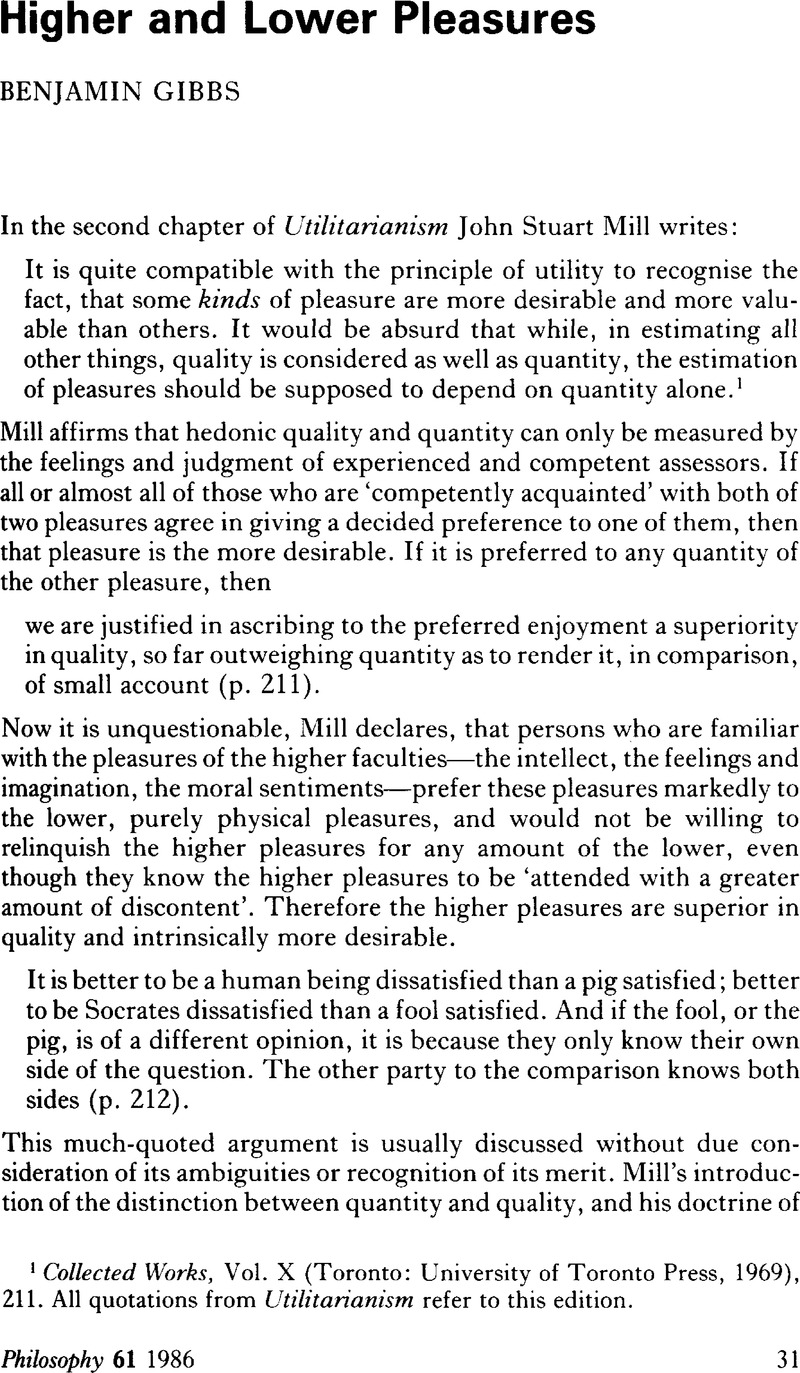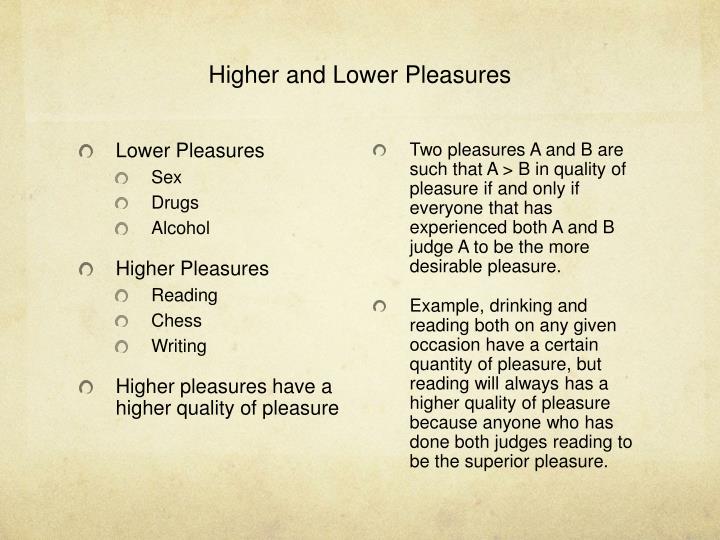Someone who lives for excitement and adrenaline-filled action may argue on the other end of the spectrum by holding that only adrenaline-filled activities should be considered higher-level pleasures. In an attempt to amend the traditional Benthamite hedonic calculus in which simply the quantity of pain or pleasure is considered Mill within his Utilitarianism postulates an additional qualitative distinction resulting in the notion of a higher or a lower pleasure.

Higher And Lower Pleasures Philosophy Cambridge Core
Only way for lowe to become higher would be a change in anture and thus would not longer be a lower pleasure.

. Mill does privilege pleasure. For example reading Philosophy or Poetry. Mills quote on higher and lower pleasures Its.
Moreover Mill contends it is an unquestionable fact that given equal access to all kinds of pleasures. Elitism is a danger only if Mill enumerates those pleasures or kinds of pleasures that are higher ones and those that are lower Although he is clearly tempted to do so Mill need not start giving lists. While an animal could be fully happy with a life of lower.
Scholars have since questioned whether such a distinction is truly justified. MIll claims that some pleasures the higher mostly mental pleasures are better than others-the lower physical animal pleasures. He argued that there were lower pleasures that were mainly connected with immediate physical gratification and delight and higher pleasures that involved delayed gratification or prior diligence.
Higher pleasures are cerebral joys while lower pleasures are sensuous pleasures. Sex eating or sleeping. A presentation of traditional utilitarianism.
He writes that happiness consists of pleasure and freedom from pain. July 22 2019 by Admin. Lower pleasures in contrast require mere sentience.
Because Mill gives no solid objective grounds at least not based on utilitarianism calculations for the higher-level pleasure it is reasonable to conclude that Mill sought to. The essay should include the following. Why does mill distinguish between higher and lower pleasures.
Mill distinguished between higher pleasures those that require mental faculties that only educated humans could obtain and lower pleasures bodily pleasures that both animals and humans could experience. For Mill higher pleasures are more valuable than lower pleasures because of their intrinsic superiority. Intellectual pleasures that help humans to develop their intellect.
Inferior pleasures of the body eg. Mill does not consider this objection and so I offer a response on his behalf. Scholars have since questioned whether such a distinction is truly justified.
Why does Mill distinguish between so-called higher and lower pleasures. Mill did however recognise that a person must first achieve the lower pleasures they need to eat and. Thus making a distinction between higher and lower pleasures allows Mill to separate himself from of earlier accounts of utilitarianism as well as replying to the criticisms leveled at utilitarianism in general.
Ergo Mill distinguishes between higher and lower pleasures in order to respond to The Philosophy of Swine Objection. A pleasure is of higher quality if people would choose it over a different pleasure even if it is accompanied by discomfort and if they would not trade it for a greater amount of the other pleasure. Higher pleasures are those pleasures that require some minimum of cognitive capacities to enjoy.
So even if we can distinguish higher and lower pleasures according to their causes it remains unclear how the hedonist is to explain how higher pleasures are inherently more pleasurable. Argument for Mill being a hedonist. Higher pleasures depend on distinctively human capacities which have a more complex cognitive element requiring abilities such as rational thought self-awareness or language use.
Mill did not think that a simple quantitative calculus could be used to make moral decisions. And since a small amount of a higher pleasure is worth any amount of a lower one even if Socrates is not fully satisfied enjoying the higher pleasures he is better off than the fool who is completely. Mill delineates how to differentiate between higher- and lower-quality pleasures.
Answer by Craig Skinner. Mill also explains that a small quantity of a higher pleasure is worth more than any vast quantity of a lower pleasure that a higher pleasure is preferred. Lower pleasures also need just awareness.
There are two types of pleasures that he introduces here. Rather than making high lower distinction just upping the pleasurableness of high of higher experiences. Human beings have needs and pleasures more elevated than their animal counterparts.
Utilitarians judge the morality of conduct by a single standard the principle of utility. In order to elevate the distinctly human pleasures above the swinish he distinguishes higher and lower pleasures but of course this introduces a moral good other than straightforward quantity of pleasure. A related concern is how this interpretation of the higher pleasures doctrine makes sense of Mills contrast between happiness and contentment or.
Pleasure and freedom from pain imply the lower pleasures which involved purely body sensations Mill p187. In an attempt to amend the traditional Benthamite hedonic calculus in which simply the quantity of pain or pleasure is considered Mill within his Utilitarianism postulates an additional qualitative distinction resulting in the notion of a higher or a lower pleasure. Higher pleasures are higher because of higher pleasurableness.
One of the most essential characteristics of Mills utilitarianism that distinguishes it from Benthams moral theory is the division between higher and lower pleasures. The difference between higher and lower pleasures is based on a theory of what humans need to flourish regardless of the data of what gives us pleasure Mill thinks that different activities can be psychologically demonstrated to produce better forms of utility in us and this is how he will distinguish jazz and polka Shakespeare and YouTube. Most utilitarian writers including Mill place supremacy in mental pleasures over bodily pleasures because of their circumstantial advantages and in regards to safety are much less.
However the distinction between quality and quantity is not new. Mill is correct about his claim as some kinds of pleasures are more desirable and valuable than others. The higher pleasures such as those found in the cultivation and enjoyment of art.
John Stuart Mill argues in Utilitarianism that higher pleasures are unique to human beings. These higher pleasures do not occur as often which then indicates that higher pleasures are more valuable as their occurrence are significantly more rare than the lower pleasures. On the other hand being a human or Socrates dissatisfied indicates higher pleasures associated with moral sentiments Mill p187.
The reason he gives is that a wise man can experience the higher pleasures whereas the fool experiences only the lower ones. He developed the Higher and Lower pleasure system. Mill recognised people must satisfy the lower pleasures but its not good to focused solely upon them.
Mill himself asserts that utilitarian writers in general have placed the superiority of mental over bodily pleasures7 What is new in Mills theory is that he rejects to measure pleasure in any. More specifically higher pleasures are intellectual pleasures while lower pleasures are sensual pleasures.

John Stuart Mill On Hedonism And Higher And Lower Pleasures Youtube

Utilitarianism A Comparison Of Bentham And Mill S Versions Ppt Video Online Download

0 Comments